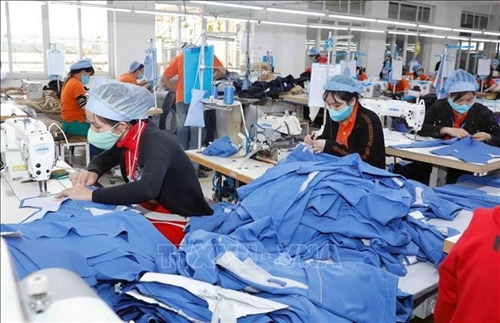Speaking to Vietnam News Agency correspondents in Prague, Vlček said bilateral trade between the E.U. and Vietnam has grown steadily by 12–15% annually, reaching over 60 billion EUR (70 billion USD) in 2024. He attributed this growth to the gradual removal of tariffs under the EVFTA, which has helped Vietnam become the E.U.’s top exporter in ASEAN, contributing to higher economic growth, job creation, and improved consumer access to quality European goods.
    |
 |
|
Garment production for export at Hung Viet Garment Company in Hung Yen province |
While the E.U. still records a trade deficit with Vietnam, Vlček noted that European companies have benefited from broader market access and global supply chain diversification. The Czech Republic, in particular, has seen fast-growing ties with Vietnam, which is now its largest trading partner in the Association of Southeast Asian Nations (ASEAN). Two-way trade hit a record 4 billion EUR in 2024, reflecting deeper cooperation based on strong diplomatic engagement and a Vietnamese community of about 70,000 people—the third largest in Europe.
The minister stressed that the EVFTA has proven to be an essential economic tool, especially amid global disruptions such as the COVID-19 pandemic, geopolitical tensions, and rising protectionism. Vietnamese industries such as electronics, textiles, and food have thrived under the agreement, driven by tariff cuts and rising E.U. demand. Companies that quickly adapted to E.U. standards have gained early market access.
For the Czech industry, tariff reductions on auto parts and assembly rules under the EVFTA have facilitated localization of production in Vietnam. Vlček cited the example of Czech automaker Škoda Auto, which entered the Vietnamese market in partnership with local firm Thanh Cong Motor in September 2023 and inaugurated a production line in Quang Ninh province in March.
He said the project represents a milestone in Czech-Vietnamese cooperation, creating jobs, expanding industrial capacity, and attracting foreign investment. Vietnam is expected to serve as a manufacturing hub for Škoda Auto and other Czech firms looking to scale operations across Southeast Asia.
The partnership between Škoda Auto and Thanh Cong Motor is an example of an emerging trend of joint ventures combining Czech technology and Vietnamese manufacturing capacity under the EVFTA’s favorable rules of origin, creating a scalable model for regional output.
However, Vlček acknowledged ongoing challenges in EVFTA implementation. These include delays in import registration, strict requirements even for EU-certified products, and unresolved issues like meat export licensing. Additional barriers include complex regulations, inconsistent recognition of international standards, and technical hurdles such as certification and product testing.
Czech companies also face language barriers and limited access to business environment information when entering the Vietnamese market.
He described Vietnam an “economic dragon” of Asia and one of the world’s fastest-growing markets, noting that reforms to reduce administrative burdens and enhance the legal environment are encouraging for European investors.
Looking ahead, he urged Vietnam to adopt more incentives for green technology and e-mobility projects, including charging infrastructure. He also emphasized the need for full ratification of the E.U. - Vietnam Investment Protection Agreement (EVIPA) to unlock the EVFTA’s full potential. The Czech Republic, one of the first E.U. countries to ratify the EVIPA, will continue urging other member states to do the same, he stated.
Source: VNA